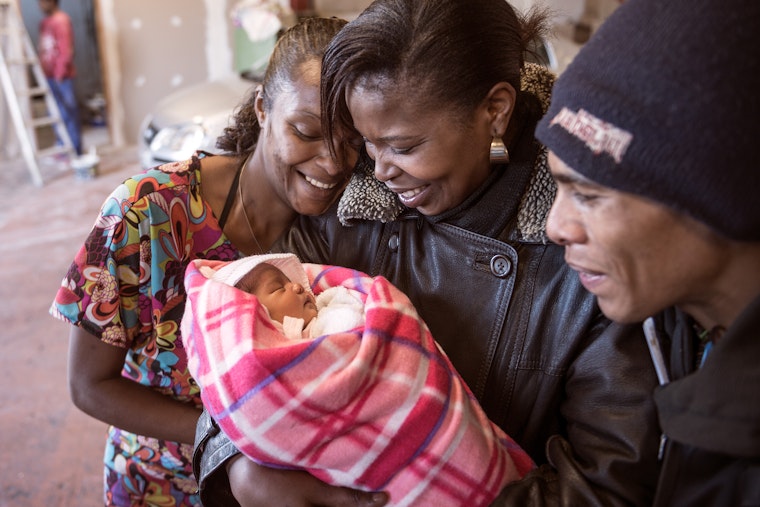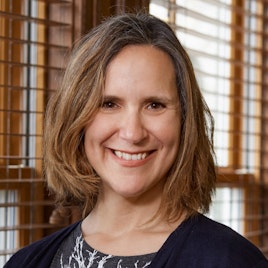The Fight to End HIV Is Also a Fight for Women’s Rights
By Julia Greenberg

Duduzile (Dudu) Dlamini is a mother, a sex worker, and an advocate for sex worker rights in South Africa. A few years ago, she went to a holiday party with coworkers at the Sex Workers Education and Advocacy Task Force (SWEAT). She couldn’t help noticing how many children there were in the room, and realized that these families needed an advocate, too. Dlamini launched Mothers for the Future as a support group and platform for sharing and speaking out.
The work her group does is desperately important. “When a sex worker is arrested,” Dlamini explained in a recent article [PDF] for the Coalition of Children Affected By AIDS, “there is nobody to take care of her children and to make sure they take their medication. If she does get someone to look after her children while she works or when she is arrested, she must then pay more money. Because of the poverty of sex workers, it is hard to make sure that their children eat, take medication and stay healthy.”
In the face of such enormous challenges, Dlamini has made great strides. In the three years since its founding, Mothers for the Future has grown into a powerful social welfare system which strives to counter the forces which make the families of sex workers particularly vulnerable to HIV, stigma, and discrimination.
Recently, in recognition of her achievements, the International AIDS Society presented Dlamini with the first Prudence Mabele Prize at the 22nd International AIDS Conference in Amsterdam.
The Open Society Foundations is proud to partner with the Ford Foundation and the Positive Women’s Network of South Africa to endow the $25,000 cash award—the largest monetary prize ever given at an International AIDS Conference. The prize is named for Prudence Mabele, who, in 1992, became the first Black woman in South Africa to publicly reveal her HIV-positive status. Until her death in 2017, and through two organizations she helped found—the Treatment Action Campaign and the Positive Women’s Network—she was a fighter for the rights of women and people living with HIV.
This work is especially vital in this moment, a time when women’s rights are under global assault from nationalist and populist governments—such as the administration of U.S. President Donald Trump—which enact anti-women, antichoice, racist, and homophobic policies.
Trump’s ideological agenda is harming the health and human rights of women and disadvantaged communities around the world. His promotion of the global gag rule prohibits organizations funded by the United States from providing or promoting any abortion services—even if this is done with non-U.S. funds.
President Trump’s version, the so-called Protecting Life in Global Health Assistance policy, expands the gag rule to all $8.8 billion of U.S. global health funding, including HIV and AIDS programs, and even water, sanitation, and hygiene projects.
At the same time, the United States continues to enforce the anti-prostitution loyalty oath for foreign recipients of funding (despite the fact that the U.S. Supreme Court struck it down for domestic organizations in 2015). This policy prohibits recipients of HIV funding from advocating for the decriminalization of sex work.
These policies are undoing decades of progress on health issues like HIV treatment and prevention. Evidence from previous versions of the global gag rule show an increase of unsafe abortions, jeopardized maternal, newborn, and child health, and reduced availability of HIV treatment and prevention programming.
Organizations are forced to make impossible choices. According to a new report form the Center for Health and Gender Equity, the Zimbabwean NGO Population Services Zimbabwe declined to apply for a grant renewal from USAID due to concerns about the ways the GGR would impact their programs, and as a result, lost more than half its funding and had to drastically scale back its outreach and family planning services.
The implications of these policies are broad and deep. In some cases aid will now be channeled to faith-based organizations with far-right, antichoice, and anti-LGBT agendas—organizations with far less experience implementing global health programs. And compliance with the gag rule can lead to a loss of funding from non-American donors, who won’t support organizations that have agreed to its restrictions.
Trump’s expanded gag rule serves to control women’s bodies and threatens marginalized and criminalized communities like sex workers.
Decriminalizing sex work has been shown to have the greatest potential to reduce health risks and human rights violations to which sex workers are vulnerable. The decriminalization of sex work is essential in the fight against HIV. As civil society is undermined, sex workers, like reproductive rights advocates, are unable to work collaboratively and risk further marginalization. As a result, human rights, specifically women’s rights, are severely undermined.
Courageous and charismatic young women like Dudu Dlamini are carrying on Prudence Mabele’s struggle for gender justice in South Africa, and provide extraordinary inspiration for women around the world. The fight against HIV is a fight for women’s rights. The campaign to decriminalize sex work, the fight against HIV and AIDS–related discrimination—these are huge issues that affect the lives of millions of women and girls.
In joining this struggle, we must challenge the laws, stigma, and discrimination that undermine health and human rights and we must pull no punches. If we fail, the fight to end AIDS threatens to become a victim in the ideological war being fought against women around the world.

Until November 2021, Julia Greenberg was the director of governance and financing at the Open Society Public Health Program.


